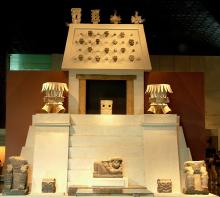teocalli (Mdz67r)
This example of the iconography of a teocalli (glossed as a "mezquita," likely by someone who had experience in the reconquest of the Iberian peninsula where the Moor had constructed their temples called by this name by those who retook that region in the late fifteenth century). This building is shown in profile, facing toward the viewer's left. It is a tall, articulated pyramidal structure with many steps. The construction at the top is like a calli, with the T-shaped wooden beams, and an added crest-like roof (perhaps of thatch).
Stephanie Wood
See similar examples of teocalli, along with calli, teopan, tetelli, and tlatelli, below. While this teocalli has vertical stripes on hits roof facade, one teocalli (below) appears to have a checked pattern on its roof facade, and the yellow-orange one may be thatched. While the teopan often does not appear to have an elaborate roof, one has a pattern of white stars on a black background. that one resembles the building on the right of the double teocalli of Tenochtitlan, which also appears in the examples below.
Stephanie Wood
mezquita
Stephanie Wood
c. 1541, or by 1553 at the latest
Stephanie Wood
buildings, edificios, temples, templos, arquitectura, crestería, madera, gradas, escaleras
teocalli. A reconstruction in the Museo Nacional de Antropología e Historia, Salón Mexica. The building on the upper level is flanked by two huehuetl drums. Near the bottom of the stairs is a Chaac Mul figure. Other characteristic elements include the two serpent heads projecting from either side of the stairway at its base. Photograph by Rober Haskett, summer 2016.
teocal(li), Indigenous temple, https://nahuatl.wired-humanities.org/content/teocalli
El Templo
Stephanie Wood
Codex Mendoza, folio 67 recto, https://digital.bodleian.ox.ac.uk/objects/2fea788e-2aa2-4f08-b6d9-648c00..., image 144 of 188.
Original manuscript is held by the Bodleian Libraries, University of Oxford, MS. Arch. Selden. A. 1; used here with the UK Creative Commons, “Attribution-NonCommercial-ShareAlike 3.0 License” (CC-BY-NC-SA 3.0)









